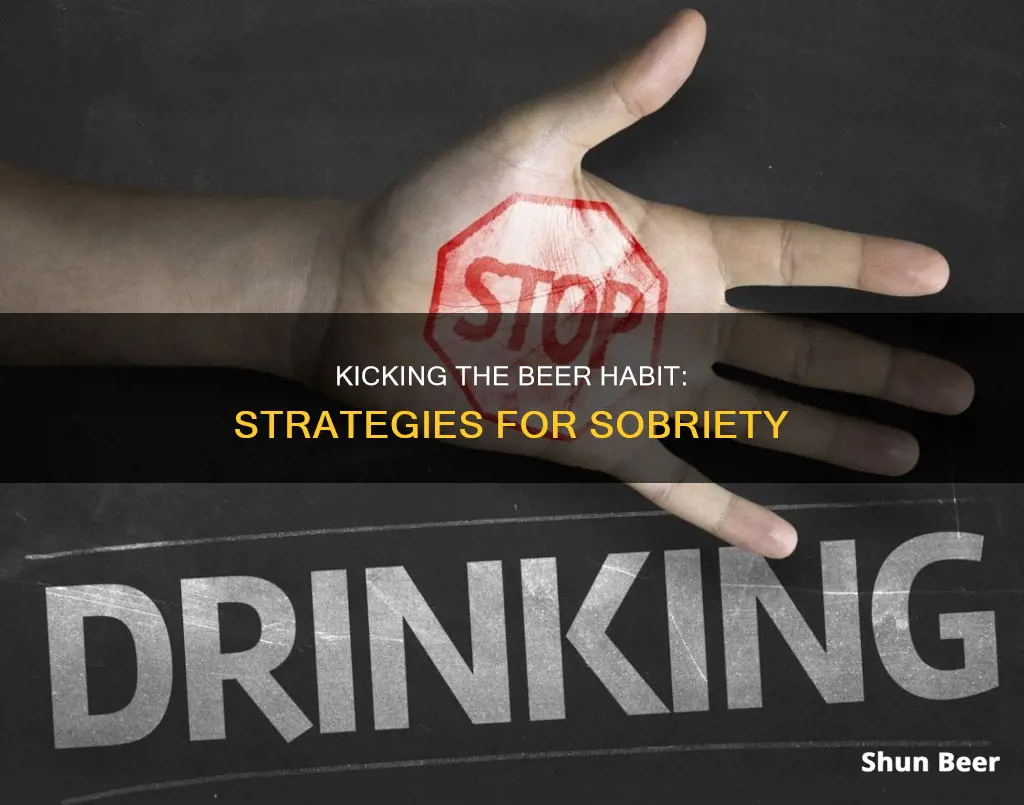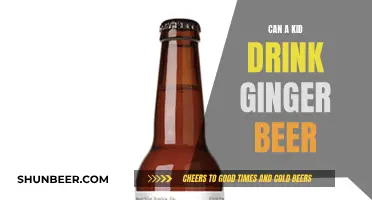
Kicking the habit of drinking beer can be challenging, but it's not impossible. There are many reasons why someone might want to stop drinking beer, from improving their health and losing weight to saving money and improving relationships.
If you're looking to cut down on your beer consumption, it's important to first understand your relationship with alcohol and identify your triggers. Knowing why you drink beer will help you explore alternative ways to address those issues more productively. It's also crucial to build a support system of family and friends who can encourage you and hold you accountable.
Practical tips include removing beer from your home, avoiding tempting situations, and finding replacement drinks and activities to distract yourself. Rewarding yourself for reaching milestones and celebrating your progress can also help keep you motivated.
Remember, it's okay to seek professional help if you need it. Many people find success through therapy, support groups, or medication prescribed by a doctor. Quitting beer can be a challenging journey, but with a solid plan and the right support, it's achievable.
| Characteristics | Values |
|---|---|
| Understand your relationship with drinking | Identify why you want to stop drinking and how much you drink |
| Seek social support | Tell your family and friends about your goal to stop drinking |
| Consistent self-care | Eat regular, balanced meals, get regular physical activity, and prioritize sleep |
| New routines | Write out a plan for each evening with activities to keep your mind busy |
| Remove alcohol from your environment | Get rid of any alcohol in your house |
| Find alternative drinks | Choose a go-to non-alcoholic drink, such as water, flavored sodas, or teas |
| Distract yourself | Stay busy with activities such as walking, sports, eating out, or watching a movie |
| Prepare for alcohol detox | Consult a healthcare professional if you're concerned about potential alcohol withdrawal symptoms |
What You'll Learn

Identify your triggers and reasons for drinking
Identifying your triggers and reasons for drinking is a crucial step in reducing your beer consumption. Here are some detailed tips to help you understand and address your drinking triggers:
Understand your triggers:
Triggers can vary from person to person, but some common ones include passing by a bar or liquor store, a certain time of day or week, stress, and even your partner or peers. Identifying these triggers is essential so you can develop strategies to manage them effectively.
Practice mindfulness:
Being aware of your thoughts and redirecting your focus away from alcohol is crucial. If you find yourself constantly thinking about drinking, try shifting your attention to something positive, like a hobby or activity that brings you joy. Mindfulness practices can help you become more aware of your thoughts and emotions, allowing you to make conscious choices instead of acting on impulses.
Manage perceived opportunity triggers:
If passing by a bar or liquor store triggers an urge to drink, consider taking a different route. If certain times of the day or week are triggers, plan alternative activities during those times, such as attending a meeting or spending time with supportive friends.
Address stress triggers:
Stress is a significant trigger for many people. To manage stress effectively, practice stress-management techniques such as exercise, meditation, or deep breathing. Counselling or therapy can also provide you with professional strategies to cope with stress in a healthy manner.
Recognize attention-allocating triggers:
These triggers arise when you constantly think about drinking or focus too much on the negative aspects of your life. Redirecting your thoughts and engaging in positive activities can help you manage these triggers.
Be aware of priming triggers:
Priming triggers occur when you mistakenly believe you can control your drinking after a period of sobriety. It's important to recognize that addiction is a chronic disease, and even one drink can lead to a full-blown relapse.
By understanding your triggers and reasons for drinking, you can develop a plan to manage your urges effectively. This might include changing your environment, finding alternative coping mechanisms, and seeking professional support if needed.
Beer and Periods: A Healthy Mix?
You may want to see also

Understand the health effects of alcohol
Understanding the health effects of alcohol is an important step in quitting drinking. Alcohol has a wide range of negative impacts on the body and brain, and these can affect your health in both the short and long term.
Short-term effects
Drinking too much alcohol on a single occasion can lead to harmful health effects, including injuries, violence, alcohol poisoning, overdose, and sexually transmitted infections or unplanned pregnancies. Alcohol plays a role in at least half of all serious trauma injuries and deaths from burns, drownings, homicides, fatal falls, and traffic crashes. Even just one bout of drinking too much may weaken your body's ability to fight off infections for up to 24 hours.
Long-term effects
Over time, drinking alcohol can have many negative effects on the body and brain. Here are some of the ways in which alcohol can impact your long-term health:
- Brain: Alcohol interferes with the brain's communication pathways and can affect the way the brain looks and works. These disruptions can change your mood and behaviour and make it harder to think clearly and move with coordination.
- Heart: Drinking too much over a long period or too much on a single occasion can damage the heart, leading to problems such as cardiomyopathy, arrhythmias, and high blood pressure.
- Liver: Heavy drinking takes a toll on the liver and can lead to a variety of problems, including fatty liver and cirrhosis.
- Pancreas: Alcohol causes the pancreas to produce toxic substances that can lead to pancreatitis, a dangerous inflammation that causes swelling and pain and impairs the pancreas's ability to produce enzymes and hormones for proper digestion.
- Cancer: Alcohol increases the risk of several types of cancer, including head and neck cancer, esophageal cancer, and breast cancer. Even one drink per day can increase a woman's risk of breast cancer by 5-15% compared to non-drinkers.
- Immune system: Drinking too much can weaken your immune system, making it easier for diseases like pneumonia and tuberculosis to take hold.
- Mental health: Alcohol can increase the risk of mental health issues such as anxiety and depression and can also lead to cognitive difficulties and memory problems, including dementia.
- Social and wellness issues: Alcohol can cause relationship problems with family and friends and can impact your performance at school or work.
Benefits of quitting
Quitting or cutting down on alcohol can have a positive impact on your health and well-being. Here are some of the benefits you may experience:
- Improved heart health: Quitting or cutting back on alcohol may lower your blood pressure, levels of fat in the blood, and your chances of heart failure.
- Weight loss: Alcohol is high in calories and can increase your appetite, so quitting can help you lose weight.
- Improved relationships: Giving up drinking can allow you to focus more on your relationships and may also ease depression and anxiety and elevate your self-esteem.
- Better sleep: Alcohol disrupts sleep patterns and can cause you to wake up repeatedly during the night, so quitting can lead to more restful sleep.
- Improved brain function: Quitting alcohol can improve your ability to think clearly and read other people's emotions.
- Lower cancer risk: While it is unclear whether quitting alcohol lowers your chances of cancer, it is clear that alcohol increases the risk of several types of cancer.
Beer and Glutathione: A Healthy Mix?
You may want to see also

Make a plan and set goals
Making a plan and setting goals are crucial steps in your journey to stop drinking beer. Here are some detailed instructions to help you through this process:
Understand Your Relationship with Alcohol:
Before making a plan, it's important to understand your drinking habits and why you want to stop. Ask yourself: Do I drink when feeling stressed or anxious? Is drinking interfering with my health, work, or relationships? Am I drinking to cope with certain issues? Being honest with yourself about your drinking patterns and motivations will help you create an effective plan.
Set Clear and Realistic Goals:
Define your goal, such as reducing the amount you drink or quitting completely. Set measurable and achievable targets. For example, you might aim for an alcohol-free week, and then gradually increase the duration. Remember to consult with a healthcare professional to determine a safe and realistic drinking limit.
Identify Your Triggers:
Triggers are situations, places, emotions, or people that make you want to drink. Identify and make a list of your triggers. For example, do you drink more when you're with certain friends, or when you're feeling lonely or stressed? Knowing your triggers will help you develop strategies to manage them effectively.
Create a Plan to Manage Triggers:
For each trigger, develop a plan of action to avoid or cope with them. For example, if drinking at home is a trigger, get rid of any alcohol in your house. If going to the pub after work is a trigger, arrange to meet friends at a cafe or the cinema instead. Planning alternative activities can help distract you from old habits and reduce the urge to drink.
Prepare for Cravings:
Anticipate that cravings will occur and have a strategy to deal with them. For example, you could call a supportive friend, practise deep breathing or meditation, or engage in a hobby to take your mind off drinking. Having a plan for when cravings strike will make you feel more confident and in control.
Monitor Your Progress:
Keep a diary or journal to track your progress. Record each day you successfully avoid drinking, and note how you feel physically and emotionally. Also, record any challenges or triggers you encounter. This will help you identify patterns, celebrate your successes, and adjust your plan as needed.
Remember, it's okay to ask for help. Share your goals and progress with supportive friends and family, and consider seeking professional support if you feel you need additional guidance or are experiencing physical dependence on alcohol.
Drink Warm Beer? The Pros and Cons Explained
You may want to see also

Change your environment and routine
Changing your environment and routine is a great way to stop drinking beer. Here are some tips to help you get started:
Remove Alcohol from Your Home
Get rid of any alcohol in your house to reduce the temptation. If you've been drinking daily, it's likely that alcohol is readily available in your home. Removing it will help you resist the urge to drink and give you time to find a distraction until the craving passes.
Find a Go-To Non-Alcoholic Drink
Choose a replacement beverage to help you resist the urge to drink beer. Water, flavoured sodas, teas, and other beverages can all be good alternatives. Having a non-alcoholic drink in your hand can also make social situations where alcohol is present easier to navigate.
Keep Yourself Busy
Engage in activities that get you out of the house and moving. Take up a new hobby or revisit an old one. Painting, board games, playing a musical instrument, and woodworking are great alternatives to drinking. Keeping busy will help distract you from old habits and break the pattern of drinking.
Change Your Routine
Introduce a new evening routine by writing out a plan for each evening that includes activities to keep your mind busy. Identify the times when you would usually drink beer and fill that time with something else. For example, if you usually go to the pub after work, organise to meet friends at the cinema instead.
Address the Reasons for Your Drinking
Think about why you've been drinking. Is it because of your job, relationship issues, stress, anxiety, or low self-esteem? Take the time to address these underlying issues. Consider finding a new job, improving your work-life balance, or seeking therapy to deal with any personal problems.
Tell People About Your Goal
Share your goal of cutting back on beer with your friends and family. They can provide encouragement and support, and hold you accountable. You might also encourage others to examine their drinking habits and find people who can join you in your journey.
STD Shots and Beer: What's Safe?
You may want to see also

Seek support from friends, family, and professionals
Seeking support from friends, family, and professionals can be a crucial step in helping you stop drinking beer. Here are some detailed tips to help you leverage your support system effectively:
Friends and Family:
- Inform your close circle: Let your friends and family know about your decision to quit drinking beer. This way, they can provide encouragement and hold you accountable. They can also help you identify triggers and avoid situations that may tempt you to drink.
- Share your successes: Regularly share your progress and achievements with your support system. This will help you stay motivated and committed to your goal.
- Ask for specific types of support: For example, you could request that they join you in activities that don't involve drinking, such as a movie night or a hike. Alternatively, you could ask them to avoid drinking around you or refrain from offering you alcoholic beverages.
Professionals:
- Reach out to your healthcare provider: Discuss your drinking habits and your goal to quit with your doctor or a member of their team. They can provide valuable advice, refer you to specialists, or prescribe medication if necessary.
- Consider therapy or counselling: A therapist or counsellor can help you explore your relationship with alcohol and address any underlying issues. They can also provide guidance on managing cravings and developing healthier coping mechanisms.
- Explore support groups: Support groups, such as Alcoholics Anonymous (AA) or SMART Recovery, offer a space to connect with others facing similar challenges. These groups can provide valuable insights, coping strategies, and a sense of community as you navigate quitting drinking.
- Look into rehabilitation programs: If you feel that your drinking has become a physical dependency or addiction, consider enrolling in a rehabilitation program. These programs offer structured support and guidance to help you understand and overcome your drinking habits.
Remember, seeking support is a sign of strength, and it can significantly increase your chances of successfully quitting drinking. Don't be afraid to lean on your loved ones and professionals during this journey.
Beer and PCOS: What You Need to Know
You may want to see also
Frequently asked questions
If you're concerned about the amount of beer you're drinking, it's a good idea to speak to your doctor. They can assess whether your drinking is affecting your health and advise on the best course of action. Some signs that you may be drinking too much beer include frequent arguments with family and friends, and feeling too tired to get work done due to drinking the night before.
There are numerous health benefits to stopping drinking beer, including lower blood pressure, improved liver function, weight loss, better sleep, and reduced risk of certain cancers and heart disease. You may also find that your relationships improve, and that you have more energy and improved mental health.
It's important to identify your triggers and develop strategies to manage them. For example, if drinking with friends is a trigger, bring a supportive friend to events where alcohol is served, or suggest meeting in a cafe or cinema instead of a bar. Keeping busy with hobbies and activities, particularly ones that get you out of the house, can also help distract you from cravings.
Some effective strategies include getting rid of any beer in your home, telling your friends and family about your goal to stop drinking, and finding alternative drinks that you enjoy, such as fruit juice, herbal tea, or alcohol-free beer.
If you're having difficulty stopping drinking beer, it's important to seek professional help. Speak to your doctor, who may refer you to an addiction specialist or support group, or prescribe medication to help reduce your desire to drink. Counselling or therapy can also provide valuable support and practical strategies for quitting and staying on track.







